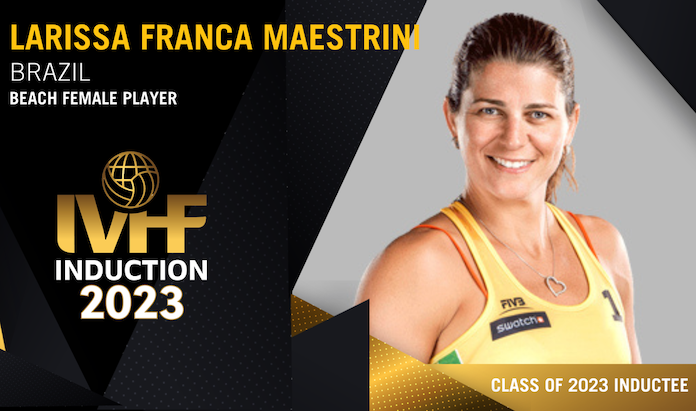
International Volleyball Hall induction week: Brazil’s Larissa
It’s induction week at the International Volleyball Hall of Fame in Holyoke, Massachusetts. The ceremony is Saturday. Six inductees will join the previous 161 players, coaches, administrators and leaders from 25 countries who have already been enshrined in the museum at the birthplace of volleyball. We have stories on all six, continuing with Larissa of Brazil:
It was truly “Acapulco Gold.”
October 30, 2005, a slugfest like no other, ever in the history of the game.
It was no less than the beach volleyball equivalent of Ali versus Frazier. A heavyweight fight to be sure. On one side of the net, the reigning Olympic champions, Kerri Walsh Jennings and Misty May-Treanor, well on their way of an epic run as the greatest women’s team in beach volleyball history.
On the other side: The upstarts from Brazil, 23-year-old Larissa Franca and her powerful 22-year-old partner, Juliana Felisberta Silva. Entering the FIVB Corona Acapulco Open, each team had five wins that 2005 season. This late-October event would determine who the FIVB team of the year would be.
Befitting a meeting of titans at the peak of their powers, the first set was a back-and-forth affair won in overtime by the Brazilians, 28-26. And while that was thrilling, it was candidly just a prelude for the second set, which left an indelible mark in the “sands of time.” No mercy, no quarter. On it went, until the exhausted Americans pulled out a 42-40 win, the equivalent in one game of a two-set match.
But the two combatants still had a third set to go!
And in the third set, it was so much more of the same, the highest level of volleyball the sport had ever seen. At the very end, Juliana and Larissa, after five losses and no wins up to that point against the Americans, finally got the monkey off their backs, winning 15-13. An epic battle that lasted 1 hour, 40 minutes, probably the longest match in the history of the modern era.
“We gave everything in that match,” Larissa recounted. “All feelings and emotions were felt in a single match: Joy, sadness, tiredness, anger, fear, overcoming, confidence, ecstasy.
“How sport is wonderful! That match is recorded in the Guinness Book of Records, AND in my body, soul and heart. That’s why I can consider this game as the most epic of my career. Thank you volleyball!”
The May-Treanor and Walsh Jennings rivalry with Larissa and Juliana defined an unforgettable eight-year era when the teams met 22 times, each one a gift to the sport of volleyball. The Americans came out on top at the end, 13-9, but in Kerri’s and Misty’s epic three gold-medal run, they never came across a foil like Larissa and Juliana.
Brazil’s Larissa Franca celebrates her 2011 World Championships victory in Rome/Reuters photo by Galbiati-Zani
Larissa Franca has enough accomplishments in her career to warrant an International Volleyball Hall nod six times over. But beyond the titles (69), the prize money won (just shy of $2 million) and the accolades (no less than 19 individual FIVB player-of-the-year honors in FIVE different playing disciplines), Larissa had style!
First off, her cut shot, indefensible. She disguised this part of her arsenal so well. But her skill at extending her arm and twisting her wrist, and having the touch to find the one open spot on the sand available was a sight to behold, if impossible to emulate.
“My coach Reis Castro encouraged us to use new resources to be used in difficult situations during games,” Larissa said. “We trained to have different strokes, at least four or five, and the cut shot was one of the favorites among these strokes, destined to surprise the opponents.”
And oh those hands!
There were not a lot of women hand setters on the tour during her international reign from 2004-2017. Yet Larissa set butter, every time out. On defense, she was a Hoover vacuum. She knew where her opponents were going to place the ball before they even did.
And then there was the mental game.
Larissa had a dead serious countenance, which never changed (except for a scowl or three) behind those omnipresent shades. Standing only 5-9, Larissa might as well have been Wilt Chamberlain. An intimidator that the game had never seen before or since.
“I’ve always been very determined and focused on my goals,” Larissa explained. “But perfectionism and the will to win, have undoubtedly accompanied me throughout my career and I believe they were determining factors for success.”
Larissa started in sports early in Paragominas, a city of 111,000 in northern Brazil. The city has one of the largest bauxite reserves in all of South America. At age 15, Franca moved to Belem in the same state of Para’ where she played indoor volleyball. In 2001 at 18 or 19, she was invited to play beach volleyball in Fortaleza, in the state of Ceara, where she ultimately began her partnership with Juliana, guided by the steady hand and experienced technical team of Castro and Oliveira.
“In the city of Fortaleza, I was helped by many important people in the development of my career over many years,” Larissa said. “I am very grateful to them, and my family, without whom I would not have achieved even half of what I (ultimately) achieved.”
Larissa at the 2016 Rio Olympics
Her resume in the sport is certainly tough to beat. No one (including Kerri and Misty) have won as many total medals as Larissa in the World Championships, five to be exact. A gold, two silvers and a bronze with Juliana, followed by a bronze in 2017 with Talita Antunes.
Larissa also won two golds in the Pan American Games, including one in her home country, in Rio de Janeiro, in 2007 in front of a bevy of family and friends.
A three-time Olympian, Larissa won a bronze with Juliana in London in 2012. But timing and circumstances conspired against Franca at the quadrennial spectacle. In 2004, Larissa and Juliana were just coming into their own, on the cusp of superstardom. In June of 2008, just 45 days before the Beijing Olympics, Juliana suffered a serious injury, which knocked them out of the running at a time when they were seemingly ready to pounce.
“(The toughest loss of my career) was not being able to participate in the 2008 Olympics,” Larissa recalled. “We were favorites for the gold medal and without a doubt it was the most difficult loss.”
After that 2012 Olympic bronze, Larissa returned to the stage again in 2016, this time with Talita, back on home soil in Rio. It is there, where they lost a heartbreaker to Walsh Jennings and April Ross in the bronze-medal match.
But, Larissa has absolutely no regrets about the arc of her career. Not by a long shot. “After many years fully dedicated to the sport, I realize how much it was worth it,” she said. “Sport has always compensated me a lot for this effort, providing me with great achievements, and unique moments, only possible for me through sport.”
After being named as an IVHF inductee Larissa was suitably humbled.
“The Olympics, and World Championships were exciting achievements, and the Hall has the same level of achievement and satisfaction. I’m really happy!”
***
Look for two more stories this week on Olympic gold medalist and four-time Olympian Phil Dalhausser (United States, beach male player), and the first member to represent Thailand in the IVHF, Shanrit Wongprasert (Thailand, leader).
ICYMI
Sunday: Silvano Prandi of Italy
Monday: Katsutoshi Nekoda of Japan
Tuesday: Yumilka Ruiz of Cuba
Click here for ticket information and if you won’t be at the ceremonies they’ll be streamed at IVHF.org
Larissa Franca tries to keep a ball in play during the 2017 World Series of Beach/Stephen Burns photo
The post International Volleyball Hall induction week: Brazil’s Larissa appeared first on Volleyballmag.com.
Read More Volleyballmag.com Olympics Beach, Pro Beach, Beach, Courtside Conversation


